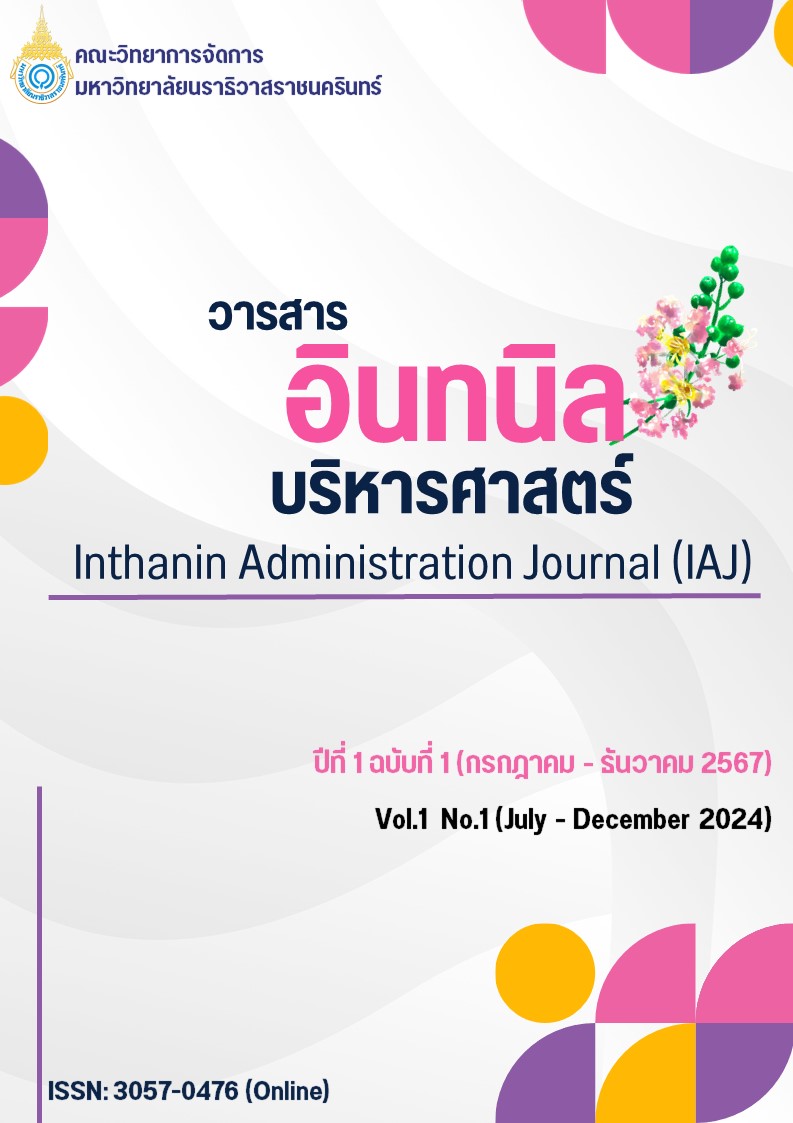The Development of Female Leaders’s Roles in Urban Communities for Sustainability: A Case Study of Narathiwat Town Municipality
Main Article Content
Abstract
This study aims to (1) analyze female leadership in urban communities within Narathiwat municipality and (2) identify sustainable development strategies for enhancing these roles. This qualitative research employs purposive sampling to select twelve female leaders, including community chairs, representatives from the Female Leadership Development Fund, and former candidates for the House of Representatives. Data were collected with in-depth interviews and analyzed using the statement analysis technique.
The findings demonstrated that female leaders in this metropolitan community have a role in balancing the management of the city with the duties of both male and female families. In terms of the economy, female leaders foster community employment, stimulate local economies through secondary occupations, and upgrade community products to OTOP status. Socially and culturally, they are involved in youth care, problem-solving, and providing initial assistance to young people. Politically and administratively, the state offers opportunities for female leaders to engage in community development, hence augmenting their positions within the community. The aspect of an environment, female leaders participate in initiatives such as waste separation and house cleaning competitions.
In order to foster the sustainable development of women's leadership in urban communities, the study recommends that women leaders be encouraged to participate voluntarily, have access to education, and have a basic understanding of politics and governance. This would dispel the myth that "women must be elephants' hind legs" and enable them gain greater acceptance in society. Furthermore, the study recommends that organizations that support women in leadership roles ought to include development planning into their responsibilities in order to enable women leaders to contribute to the creation of sustainable communities.
Article Details
References
กรมกิจการสตรีและสถาบันครอบครัว. (2565). แผนปฏิบัติการด้านการพัฒนาสตรี (2566-2570). ศูนย์สาธารณประโยชน์และประชาสังคม สถาบันบัณฑิตพัฒนบริหารศาสตร์.
จิตรา แสงวัฒนาฤกษ์.( 2563). บทบาทผู้นำสตรีอาสาเชิงพุทธบูรณาการ. วารสารสันติศึกษาปริทรรศน์ มจร,
(4), 1622-1638. https://so03.tci-thaijo.org/index.php/journal-peace/article/view/242 237/166506
ฉวีวรรณ แจ่มหมวก. (2555). สตรียุคใหม่ ผู้นำการเปลี่ยนแปลง (พิมพ์ครั้งที่ 2). สตาร์บุ๊คส์.
ทิพวรรณ หล่อสุวรรณรัตน์. (2566). ปรัชญาใหม่ของนิด้า: สร้างปัญญาเพื่อการพัฒนาที่ยั่งยืน. สถาบันบัณฑิตพัฒนบริหารศาสตร์.
ธนภัทร ศรีวะรมย์. (2561). การพัฒนาบทบาทสตรีในการเสริมสร้างชุมชนปลอดบุหรี่ผ่านกระบวนการวางแผนแบบมีส่วนร่วม กรณีศึกษา : ตำบลปาฝา อำเภอจังหาร จังหวัดร้อยเอ็ด [วิทยานิพนธ์ปริญญามหาบัณฑิต, มหาวิทยาลัยสารคาม]. http://202.28.34.124/dspace/bitstream/123456789/244 /1/57011380004.pdf
ธัญญธร บุญอภัย, พักตร์วิภา โพธิ์ศรี และสมหมาย แจ่มกระจ่าง. (2563). สตรีในการพัฒนาสังคม. วารสารการศึกษาและการพัฒนาสังคม, 15(2), 291-301. https://edu.buu.ac.th/vesd/PDF62-2/a2562-2[298-308].pdf
ธนิษฐา สุขะวัฒนะ. (2551). สร้างการปกครองท้องถิ่นให้เป็นรากฐานพัฒนาประชาธิปไตย. สถาบันพระปกเกล้า.
พุทธินันต์ ภาคเจริญ. (2565). แนวทางการพัฒนาชุมชนหมู่บ้านไปสู่ความยั่งยืนในบริบทของสังคมเมืองกรณีศึกษาหมู่บ้านดงยาง หมู่ที่ 12 ตำบลสวนกล้วย อำเภอบ้านโป่ง จังหวัดราชบุรี [วิทยานิพนธ์ปริญญามหาบัณฑิต, มหาวิทยาลัยศิลปกร]. http://ithesis-ir.su.ac.th/dspace/bitstream/12 3456789/4548/1/641220024.pdf
วิภาพรรณ อุปนิสากร, ภักดี โพธิ์สิงห์ และสัญญา เคณาภูมิ. (2559). การพัฒนาบทบาททางการเมืองของสตรี. วารสารธรรมทรรศน์, 16(3), 51-61. https://so06.tci-thaijo.org/index.php/dhammathas/article/view/79727/63607
สหประชาชาติ. (2567). การสนับสนุนของสหประชาชาติต่อการพัฒนาที่ยั่งยืนในประเทศไทย. https://thailand.un.org/th/sdgs
อณิษฐา หาญภักดีนิยม. (2564). รูปแบบการขับเคลื่อนบทบาทสตรีต่อการพัฒนาชุมชนที่ยั่งยืน ในศตวรรษที่ 21. วารสารสังคมศาสตร์และมานุษยวิทยาเชิงพุทธ, 6(4), 355-371. https://so04.tci-thaijo.org/index.php/jsba/article/view/249932/170351
อุษณีย์ สุวรรณ์. (2558). บทบาทสตรีในการพัฒนาชุมชนตามหลักปรัชญาของเศรษฐกิจพอเพียง ในชุมชนวัดสะพาน อำเภอเมือง จังหวัดชัยนาท [วิทยานิพนธ์ปริญญามหาบัณฑิต, มหาวิทยาลัยศิลปกร]. http://ithesis-ir.su.ac.th/dspace/bitstream/123456789/122/1/3.54260313%20%E0%B8 %AD%E0%B8%B8%E0%B8%A9%E0%B8%93%E0%B8%B5%E0%B8%A2%E0%B9%8C% 20%E0%B8%AA%E0%B8%B8%E0%B8%A7%E0%B8%A3%E0%B8%A3%E0%B8%93%E0%B9%8C.pdf


